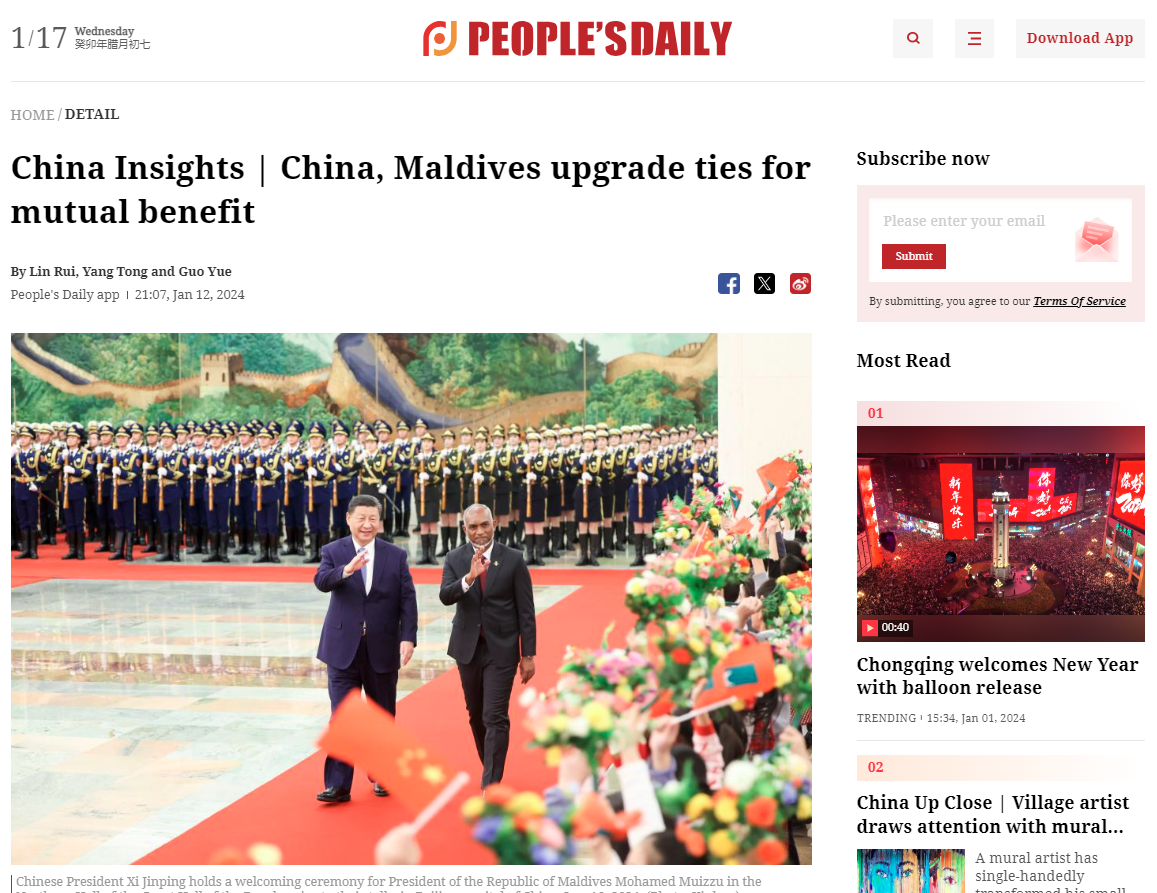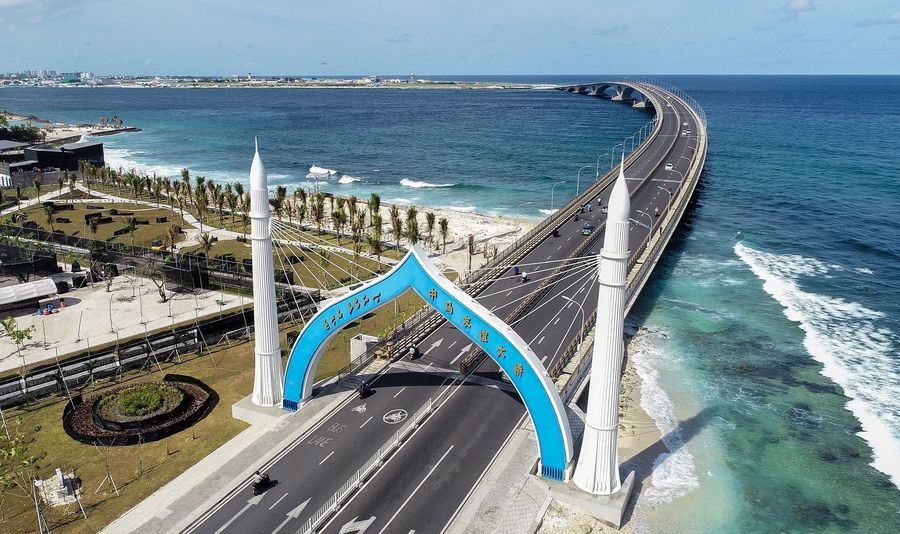LATEST INSIGHTS
Your Present Location: LATEST INSIGHTSLiu Zongyi: China Insights | China, Maldives upgrade ties for mutual benefit
Source: People's Daily Published: 2024-01-12

Maldivian President Mohamed Muizzu ended his five-day state visit to China on Friday.
During the visit, the two countries' leaders announced the elevation of bilateral ties to a comprehensive strategic cooperative partnership.
Chinese experts told the People's Daily that the visit of the newly elected Maldivian president would inject a new vitality into China-Maldives relations, which have experienced a period of stagnation.
The Maldives attaches great importance to ties with China, which is a choice based on its own interests, the experts agreed.
Equal relations
During the visit, Muizzu held talks with President Xi Jinping and had meetings with Li Qiang, Premier of the State Council, and Zhao Leji, Chairman of the Standing Committee of the National People's Congress.
The elevation of ties is necessary alongside the growth of bilateral relations and meets the expectations of the two peoples, Xi told Muizzu in Beijing on Wednesday.
Muizzu said he was honored to pay his first state visit to China with a number of important cabinet ministers and become the first foreign head of state that China has hosted this year, fully demonstrating the great importance both sides attach to the development of bilateral relations.
The upgrading of China-Maldives relations will be mainly reflected at a strategic level of future cooperation between the two countries, said Hu Shisheng, director of the Institute for South Asian Studies at the China Institutes of Contemporary International Relations in Beijing.
From the perspective of China, Hu said, the Maldives is at a key node of the Maritime Silk Road and the two sides can promote cooperation on the Belt and Road Initiative in the Indian Ocean.
Meanwhile, the Maldives will also be the best demonstration base for China to build a community with a shared future for mankind and implement China's global initiatives: the Global Security Initiative, the Global Development Initiative and the Global Civilization Initiative.
From the perspective of the Maldives, Hu said, the Maldives faces development problems, environmental protection problems, secondary disasters caused by disorderly global governance and the problem of large infrastructure construction due to its scattered islands.
China has the resources and advantages to help the Maldives meet its national development needs on these problems, he believed.
After their talks, the two heads of state witnessed the signature of an action plan to establish the China-Maldives comprehensive strategic cooperative partnership, as well as cooperation documents on the construction of the Belt and Road, disaster management, the economy and technology, infrastructure, people's livelihoods, green development, and the blue and digital economies.
The two countries issued a joint press communiqué on Thursday.
Such equal cooperation between small and large countries can provide an example of diplomatic fairness in international relations, Hu said.
The policy of cooperation with China not only reflects the Maldives' need to safeguard its national interest but also an adjustment to the unbalanced policy of Muizzu's predecessor, Hu said.
'The policy adjustments also reflect the country's public opinion,' he said.
As a sovereign state, it is not in the interest of the Maldives to take sides among major powers, Hu said. 'Therefore, its best strategy is to adopt a balanced policy among the major powers.'
Lin Minwang, deputy director of the Center for South Asian Studies and assistant to the dean of the Institute of International Studies at Fudan University in Shanghai, said the Maldives hopes to develop equal relations with major powers.
'The Maldives will move closer to anyone who is beneficial to its development,' he said.
Belt and Road
China has played a significant role in infrastructure construction and economic development in the Maldives, Lin said.
Under the Belt and Road Initiative, China has already helped the Maldives expand the Velana International Airport in Male and built the cross-sea China-Maldives Friendship Bridge.

Chinese enterprises have been involved in cooperation projects including affordable housing units, new energy, power grids, office buildings and waste disposal.
Infrastructure construction not only promotes an improvement in people's livelihoods but also helps the Maldives achieve rapid economic and social development, Lin said.
Muizzu has a positive attitude towards developing relations with China and the Belt and Road Initiative, Lin said.
'President Muizzu's visit will stimulate more Chinese companies' interest in the Maldives,' he said.
Muizzu attended the 2024 Invest Maldives Business Forum in Fuzhou, the capital of Fujian Province, on Tuesday.
There are more large investors at the forum this year, especially connected with airlines, financial institutions and construction companies, according to media reports.
Liu Zongyi, senior fellow of the Institute for International Strategic and Security Studies Center for Asia-Pacific Studies at Shanghai Institute for International Studies, said the trip to Fujian would help Muizzu gain a deeper understanding of China's modernization and provide valuable insights into governing and leading his country's development.
Tourism
China will promote more direct flights between the two countries, Xi said.
Maldives' travel and tourism sector constituted 79 percent of its economic growth in 2022, according to the Asian Development Bank.

In 2019 Chinese tourists represented 19.7 percent of foreign visitors, making them the biggest tourist group, Reuters reported.
In 2023 the Maldives received about 1.87 million foreign tourists, of which about 187,000 were Chinese tourists, or 10 percent, ranking among the top three, according to the Maldives Ministry of Tourism.
'The Maldives is facing economic difficulties,' Liu said.
Factors such as the COVID-19 pandemic and the US Federal Reserve's interest rate hike have dealt a heavy blow to Maldives tourism while rising international commodity prices have also increased its import costs, he said.
Cooperation with China will help facilitate the recovery of the Maldives economy, the expert believed.
Fishing is the largest source of employment in the Maldives, where 99 percent of its territory comprises the sea. Aquatic products account for over 98 percent of exports by volume and value, according to official Maldives statistics.
The fishery has great potential for cooperation between China and the Maldives, Liu said.
The Maldives also depends on imports for energy and China has advanced green energy technology, he noted.
Key Words: Liu Zongyi, Maldives, BRI























































































 京公网安备 11010802037854号
京公网安备 11010802037854号





